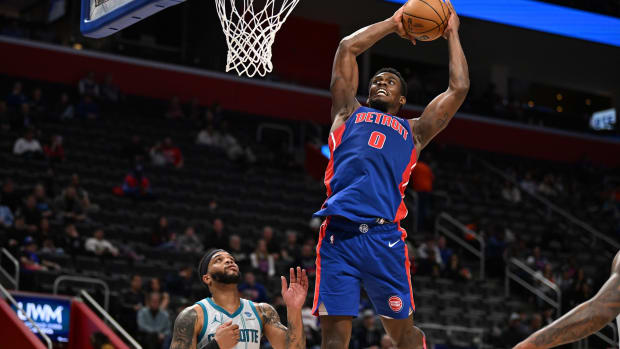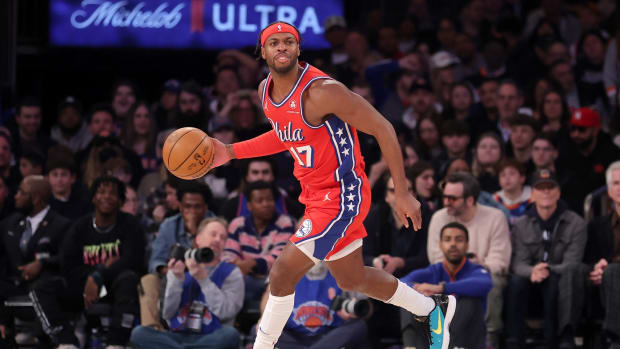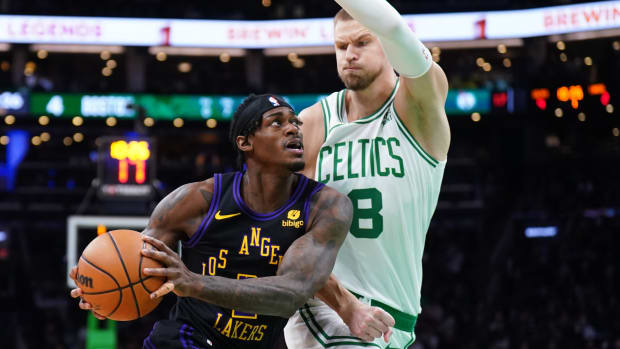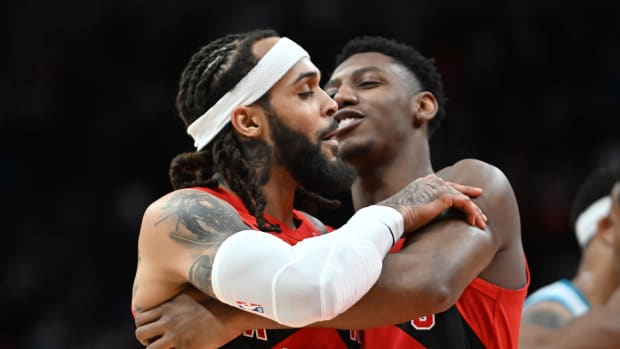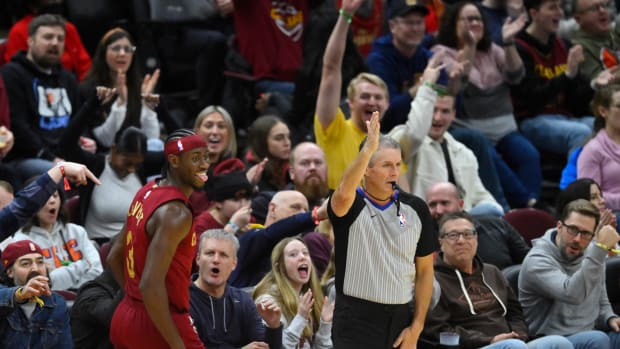NBA Off-Season Preview: Should The Raptors Keep The Band Together?
While the NBA playoffs are still going, the 2017 off–season is rapidly approaching for many teams with massive decisions to make. CBA expert Danny Leroux breaks down the major challenges and opportunities for the Toronto Raptors in The Crossover's NBA Summer Preview series.
Last summer, Toronto retained All-Star shooting guard DeMarDeRozan with a five-year, $139 million contract that appeared to lock in their direction as a franchise for years to come. After all, they had already ponied up to sign DeMarre Carroll and extend Jonas Valanciunas and Terrance Ross in 2015. Even with the rising salary cap, those four contracts plus the eventual big deal for Kyle Lowry was enough to put them on the brink of the luxury tax. Those dynamics changed over the course of the 2016-17 season, as general manager MasaiUjiri traded Ross and draft picks for Serge Ibaka from Orlando and PJ Tucker from Phoenix, both of whom are free agents this summer. While the additions helped the Raptors survive Lowry’s wrist injury, the team was again unable to get past the Cleveland Cavaliers, this time being swept out of the second round instead of the conference finals.
That series of events sets up a truly fascinating summer for the Raptors. Here are three key storylines to watch this off–season:
What happens to Kyle Lowry? The three-time All-Star will be eligible for a five-year, $205 million contract at the current projections and that is a massive investment in a 31-year old point guard. Other teams potentially offering the maximum they can give him (four years, $152 million) inevitably puts extra pressure on the Raptors' front office. With an older point guard and an aging roster, there is no right answer to whether ownership should be willing to pay. Rather, they should choose the option they are most comfortable with now and moving forward.
Serge Ibaka and the other unrestricted free agents: Part of the reason Ibaka and Tucker came at reasonable prices at the deadline was their pending unrestricted free agency. While the Raptors hold full Bird rights on both, which allow them to pay any salary up to their respective maximums, the veterans are free to accept a contract with any team without match rights or compensation for Toronto. On top of Lowry, Ibaka and Tucker, power forward Patrick Patterson is in the same boat, giving the Raptors a tough situation because each of those four can separately exert pressure on the front office since their overall cap situation makes it functionally impossible to replace them with new signees. If ownership wants to stay competitive in the Eastern Conference, they will be paying most or all of that post-prime quartet for years to come.
Cost mitigation: If the Raptors choose to retain all or most of their expensive free agents, they could potentially reduce their prodigious luxury tax bill by moving Valanciunas, Carroll, Cory Joseph or some combination of the three. However, doing so will require interested trade partners since so few teams will have significant salary cap space. Joseph’s $7.6 million salary and $7.9 million player option for 2018-19 makes him the most tradable since backup point guards are always in demand but moving the Toronto native also brings the least luxury tax savings.
Potential Free Agents: Kyle Lowry ($12M Player Option), Serge Ibaka (Unrestricted), Patrick Patterson (Unrestricted), PJ Tucker (Unrestricted) and Fred VanVleet (Non-Guaranteed)
Likely Cap Space For 2017: None
Realistic Max Contract Cap Space For 2017 (using $101M estimate): None
2017 Draft Assets: Clippers’ first round pick (No. 23 overall). Owed second-round pick to Phoenix from the Tucker trade.
Are The Current Raptors Headed For Extinction?
Potential Targets: The Raptors’ biggest expenditures will be their own free agents regardless of whom they end up retaining. In all likelihood, they will be working with the Taxpayer Mid-Level exception, which will start at $5.2 million (contracts can span up to three seasons). The best way to secure a contributor at that low a salary would be to attract a veteran willing to take a pay cut for a one-year deal, but Toronto cannot offer much playing time either. As such, their best use would be to replace a departing free agent, like Anthony Tolliver or Ersan Ilyasova if Patrick Patterson heads elsewhere. They could also make a bet on a young player but it would have to be on the low end (KJ McDaniels, Christian Wood or James Michael McAdoo) because better restricted free agents will expect a higher salary or just get matched by their current team.
Pressure Scale: 10. While Masai Ujiri and ownership seemed to make their long-term decision last year by retaining DeRozan on top of existing extensions, this summer is really their last chance to set the path of the franchise for the next five years. They would be totally within their rights to keep this group together and continue the strongest run in franchise history but that will be extremely expensive. Furthermore, contracts for DeRozan, Lowry and Ibaka will not age well, so it will be hard get out from under the new burdens should the front office want to change course later on.
The Case For: Cavs-Warriors Ruining NBA Playoffs
State of the Franchise: Maintaining, probably. While the Raptors could tear it down this summer, the most likely outcome is that they largely run it back and hope some of their young players can take on larger roles like Norman Powell did this season. The cost mitigation discussed above would be a logical option if they can find the right trade partner but Toronto also has to keep an eye out because all of their key free agents will be unrestricted and can head elsewhere for whatever reason they want. Patterson and Tucker, in particular, can use that to squeeze more out of the Raptors because it would be functionally impossible to replace them with only the Mid-Level exception. Teams rarely deconstruct the best collection of talent in franchise history and ownership signed off on Ujiri’s moves with an understanding of what would follow, so expect a largely similar Raptors team to take the floor next season.
































